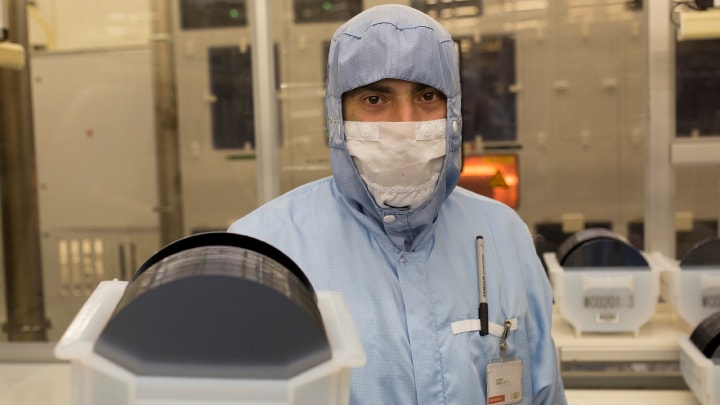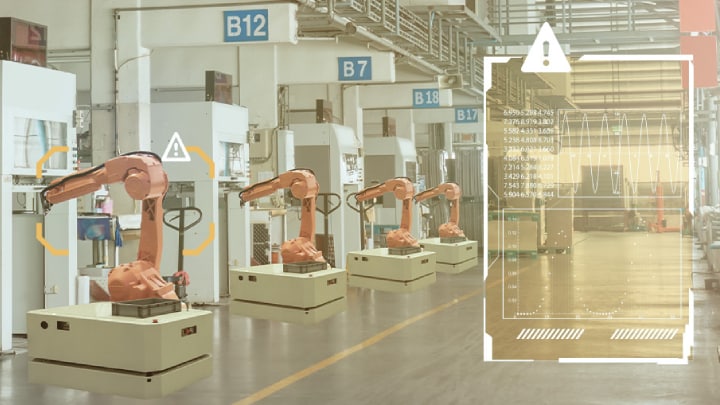The gravity and scale of the COVID-19 pandemic produced a remarkable response from the scientific community, with researchers around the world moving at record speed to develop viable vaccine options for emergency use.
Now, as the world begins to vaccinate an unprecedented number of people as quickly as possible, there are new challenges to face. Rapid vaccination on a global scale is a massive undertaking that will ultimately involve manufacturing, shipping and administering billions of doses worldwide.
The medical supply chains that support healthcare need to ensure timely delivery, and there are a number of wireless edge technologies that can help support vaccine distribution . Even before the pandemic, supply chains of all kinds, including those used by the pharmaceutical industry, had started using wireless technologies to bring new levels of efficiency and safety to the process of delivering goods. These wireless-enabled supply chains are well equipped to meet the present need for rapid, secure and safe delivery of COVID-19 vaccines.
Smart Packaging
Digital ID tags, which combine a microchip with a wireless edge technology, such as RAIN RFID or NFC , give packages cloud connectivity and unique digital identifiers. Attaching a digital ID tag to a shipping container, a carton, box, or tray creates a smart package with a unique identity that can be verified, tracked, and monitored wherever the package goes, and for however long it’s in use. Digital ID tags also offer features that protect perishables and guard against tampering, so they can safeguard shipments of COVID-19 vaccines while helping to improve logistics and supply-chain operations.
Efficient Delivery
Digital ID tags could make it possible to get an accurate account of every vial’s whereabouts, and make it easy to check status and highlight exceptions. RAIN RFID readers can read many hundreds of tags and labels in just a few seconds, even if containers are in motion, so vaccine shipments can be processed quickly and with little to no human interaction. What’s more, the reader can be mounted several meters away and doesn’t need line of sight to get an accurate tally. This kind of fast, automated processing is one of the reasons why RAIN RFID is already widely used in the supply chains that support transport, fleet-management applications, and international shipping.
Once the vaccine has arrived at its destination, having real-time information about what’s available and where it’s located makes it easier to manage COVID-19 vaccine inventories, so stocks can be allocated more efficiently and there’s less waiting or waste. Hospitals and other healthcare providers can also use real-time inventory management to pay for vaccines as they use them, instead of making a large up-front purchase for doses they have to then store and may not end up using. At the same time, easier and more precise inventory management can help organizations keep track of the other items needed for the COVID-19 response, too, including Personal Protective Equipment (PPE).
Safe Handling
Temperature-controlled supply chains, known as cold chains, are widely used to store and transport perishables, including many vaccines and everyday medications.
Contactless tags equipped with temperature-logging sensors make it possible to record each shipment’s temperature history, so it’s easy to confirm that a given box has been handled properly and is ready for use. At the doctor’s office, for example, simply tapping a smartphone to an NFC label can verify that the vaccine shipment meets quality-control standards. In similar fashion, sensors that record vibration or tipping can confirm that the vaccine vials inside a package haven’t been damaged or leaked their contents while in transit.
Tags equipped with a conductive tamper loop can be used to confirm that every layer of packaging is intact, from pallets and shipping containers to individual cartons and trays. Tamper-evident tags let medical practitioners know if any package with a vaccine inside has been opened, and help remove doubts about whether a given shipment of vaccines has been diluted, refilled, or otherwise substituted from the original.
Verified Authenticity
Fraud, theft and channel diversions are, unfortunately, an ever-present threat to medical supply chains because valuable and highly sought-after medications and supplies are attractive prey for those seeking an illicit profit. Channel diversions are of particular concern, since authentic vaccines can be bought at discounted prices in one region and then sold at a higher price in another region, leading to possible shortages in low-price countries.
RAIN RFID and NFC tags are available with added security features, such as AES cryptography, so they can offer an added layer of protection. With secure ID tags, a given vaccine shipment can communicate its intended destination, making it easier to uncover channel diversions when vaccines reserved for one place show up somewhere else.
AES cryptography is recognized in the security industry as one of the most effective ways to protect against attacks from unauthorized parties. Communications between the reader and tag can be trusted because each communication is based on a new computation and is therefore different every time information is exchanged. This randomness protects the communication from deciphering or copying. Also, the secrets that enable secure communication (the crypto keys) are protected in secure vaults embedded in the chip. The crypto keys never leave this secure vault, so they are protected from being “sniffed” or otherwise intercepted.
Confirming authenticity has become an especially serious issue during the pandemic, as unsafe medical items, such as counterfeit face masks, substandard sanitizers and unauthorized anti-viral medications have entered the supply chain. Secure RAIN RFID and NFC tags make it easy to securely verify that a product is genuine and meets regulatory standards. As a result, healthcare professionals, store clerks or consumers at home can verify authenticity in real time, using easy yet secure online authentication checks with their smartphones.
Technologies to Watch
As supply chains continue to evolve, several emerging technologies are beginning to work alongside proven RAIN RFID and NFC solutions, adding extra layers of efficiency and flexibility.
Ultra-Wide Band (UWB)
UWB uses impulse radio signals to determine the relative position of objects with a very high degree of accuracy and can operate in crowded or multipath signal environments. Pinpoint accuracy has made UWB a premium choice for warehousing applications, where self-guided robots can pick and place items with a high degree of accuracy. When handling vaccines and other medical supplies, UWB can be relied upon to save time spent searching for items in a large warehouse. UWB can also improve safety in busy, crowded shipping centers, as automatic guided vehicles and other robots are better equipped to prevent accident and keep people out of harm’s way.
Drones
Unmanned aerial vehicles are starting to be used in warehouses and as delivery mechanisms for all kinds of goods. Several government agencies, including the Federal Aviation Administration (FAA) in the United States, require that drones above a certain weight be registered. Low-cost NFC simplifies this kind of registration, making it easy to identify the drone, its registration number, zoning classification and airspace authorizations.
Machine Learning (ML) and Artificial Intelligence (AI)
When equipped with ML and AI algorithms, the smart containers can be made even more effective, with new levels of automation and responsiveness. In the cold chain, for example, a container carrying medical supplies can predict changes in temperature as it moves from location to location, and can automatically adjust the cooling as needed. The convergence of AI and supply-chain technology can also bring new levels of autonomy and flexibility to how items are stored and delivered. More precise demand forecasting, delivery route optimization and virtual assistants are just a few examples of how AI can make the supply chain, and the people who work in it, more productive.
COVID-19 Is Accelerating Adoption
In recent years, industries across all segments have started looking at ways to use connectivity and digitalization to improve supply chains at every point, from the source to the end user. The medical industry has, in many ways, led the way in this regard, since pharmaceuticals and other medical supplies benefit from the real-time traceability and security that wireless technologies like RAIN RFID, NFC, and UWB offer the supply chain.
The pandemic has put certain trends in fast forward, with people adopting technology at a faster rate than before COVID-19 came on the scene. In the medical supply chain, the urgent need for safe, authentic vaccines and other medical supplies highlighting the benefits of wireless edge technologies. As mass immunization gets underway and the pandemic begins to subside, these technologies are likely to gain adoption, helping to streamline operations even after the crisis is over.
NFC for Pharmaceutical Companies
Also, look for our upcoming blog on how pharmaceutical companies can use NFC and HF technologies to deliver products safely to health professionals and their patients, whilst enabling digital vaccination records .




